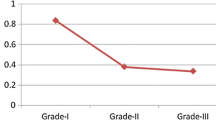Abstract
Background
To investigate the prognostic significance of altered breast cancer susceptibility gene 1 (BRCA1) and p53 expression in triple-negative breast cancer (TNBC).
Methods
Immunohistochemical expression of BRCA1 and p53 was examined in the tumor tissues of 465 TNBC cases and relations were sought with clinicopathological features and patient survival.
Results
Loss of BRCA1 expression was found in 29.5% (137/465) of TNBCs. Positive expression of p53 was observed in 49.9% (232/465). Patients with loss of BRCA1 expression had a tendency to have higher rate of lymph node metastasis (p = 0.075). An association between p53 expression and high histological grade was observed (p = 0.039). TNBC patients with loss of BRCA1 expression had a tendency to have poorer overall survival (OS) than those positive for BRCA1 (p = 0.09). TNBC patients with positive p53 expression showed better OS than those with p53 negativity (p = 0.001). In terms of combined expression patterns, significantly poorer overall survival (OS) was observed for BRCA1-negative/p53-negative TNBCs and best OS for BRCA1-positive/p53-positive TNBCs (p = 0.005).
Conclusions
Combined expression patterns of BRCA1 and p53 could serve as useful prognostic markers in TNBC.



Similar content being viewed by others
References
Dent R, Trudeau M, Pritchard KI, et al. Triple-negative breast cancer: clinical features and patterns of recurrence. Clin Cancer Res. 2007;13:4429-34.
Tischkowitz M, Brunet JS, Begin LR, et al. Use of immunohistochemical markers can refine prognosis in triple negative breast cancer. BMC Cancer. 2007;7:134.
Kim J, Hwang T, Kang S, Lee S, Bae Y. Prognostic Significance of Basal Markers in Triple-negative Breast Cancers. J Breast Cancer. 2009;12:4-13.
Choi JE, Kang SH, Lee SJ, Bae YK. Prognostic significance of Bcl-2 expression in non-basal triple-negative breast cancer patients treated with anthracycline-based chemotherapy. Tumour Biol. 2014;35:12255-63.
Choi JE, Kang SH, Lee SJ, Bae YK. Androgen receptor expression predicts decreased survival in early stage triple-negative breast cancer. Ann Surg Oncol. 2015;22:82-9.
Somasundaram K. Breast cancer gene 1 (BRCA1): role in cell cycle regulation and DNA repair–perhaps through transcription. J Cell Biochem. 2003;88:1084-91.
Ouchi T, Monteiro AN, August A, Aaronson SA, Hanafusa H. BRCA1 regulates p53-dependent gene expression. Proc Natl Acad Sci U S A. 1998;95:2302-6.
Zhang H, Somasundaram K, Peng Y, et al. BRCA1 physically associates with p53 and stimulates its transcriptional activity. Oncogene. 1998;16:1713-21.
Miki Y, Swensen J, Shattuck-Eidens D, et al. A strong candidate for the breast and ovarian cancer susceptibility gene BRCA1. Science. 1994;266:66-71.
Yoshikawa K, Honda K, Inamoto T, et al. Reduction of BRCA1 protein expression in Japanese sporadic breast carcinomas and its frequent loss in BRCA1-associated cases. Clin Cancer Res. 1999;5:1249-61.
Yang Q, Sakurai T, Mori I, et al. Prognostic significance of BRCA1 expression in Japanese sporadic breast carcinomas. Cancer. 2001;92:54-60.
Kurebayashi J, Yamamoto Y, Kurosumi M, Okubo S, Nomura T, Tanaka K, Sonoo H. Loss of BRCA1 expression may predict shorter time-to-progression in metastatic breast cancer patients treated with taxanes. Anticancer Res. 2006;26:695-701.
Rakha EA, El-Sheikh SE, Kandil MA, El-Sayed ME, Green AR, Ellis IO. Expression of BRCA1 protein in breast cancer and its prognostic significance. Hum Pathol. 2008;39:857-65.
Zhu X, Shan L, Wang F, et al. Hypermethylation of BRCA1 gene: implication for prognostic biomarker and therapeutic target in sporadic primary triple-negative breast cancer. Breast Cancer Res Treat. 2015;150:479-86.
Yamashita N, Tokunaga E, Kitao H, et al. Epigenetic Inactivation of BRCA1 Through Promoter Hypermethylation and Its Clinical Importance in Triple-Negative Breast Cancer. Clin Breast Cancer. 2015;15:498-504.
Okada S, Tokunaga E, Kitao H, et al. Loss of heterozygosity at BRCA1 locus is significantly associated with aggressiveness and poor prognosis in breast cancer. Ann Surg Oncol. 2012;19:1499-507.
Lacroix M, Toillon RA, Leclercq G. P53 and Breast Cancer, an Update. Endocr Relat Cancer. 2006;13:293-325.
Borresen-Dale AL. TP53 and breast cancer. Hum Mutat. 2003;21:292-300.
Petitjean A, Mathe E, Kato S, Ishioka C, Tavtigian SV, Hainaut P, Olivier M. Impact of mutant p53 functional properties on TP53 mutation patterns and tumor phenotype: lessons from recent developments in the IARC TP53 database. Hum Mutat. 2007;28:622-9.
Dumay A, Feugeas JP, Wittmer E, et al. Distinct tumor protein p53 mutants in breast cancer subgroups. Int J Cancer. 2013;132:1227-31.
Bertheau P, Lehmann-Che J, Varna M, et al. P53 in Breast Cancer Subtypes and New Insights into Response to Chemotherapy. Breast. 2013;22 Suppl 2:S27-9.
Pharoah PD, Day NE, Caldas C. Somatic mutations in the p53 gene and prognosis in breast cancer: a meta-analysis. Br J Cancer. 1999;80:1968-73.
Biganzoli E, Coradini D, Ambrogi F, et al. P53 Status Identifies Two Subgroups of Triple-Negative Breast Cancers with Distinct Biological Features. Jpn J Clin Oncol. 2011;41:172-9.
Coates AS, Millar EK, O’Toole SA, et al. Prognostic interaction between expression of p53 and estrogen receptor in patients with node-negative breast cancer: results from IBCSG Trials VIII and IX. Breast Cancer Res. 2012;14:R143.
Maeda T, Nakanishi Y, Hirotani Y, et al. Immunohistochemical co-expression status of cytokeratin 5/6, androgen receptor, and p53 as prognostic factors of adjuvant chemotherapy for triple negative breast cancer. Med Mol Morphol. 2016;49:11-21.
Jin MS, Park IA, Kim JY, et al. New insight on the biological role of p53 protein as a tumor suppressor: re-evaluation of its clinical significance in triple-negative breast cancer. Tumour Biol. 2016. doi:10.1007/s13277-016-4990-5.
Thike AA, Cheok PY, Jara-Lazaro AR, Tan B, Tan P, Tan PH. Triple-negative breast cancer: clinicopathological characteristics and relationship with basal-like breast cancer. Mod Pathol. 2010;23:123-33.
Thangaraju M, Kaufmann SH, Couch FJ. BRCA1 facilitates stress-induced apoptosis in breast and ovarian cancer cell lines. J Biol Chem. 2000;275:33487-96.
Miyamoto K, Fukutomi T, Asada K, et al. Promoter hypermethylation and post-transcriptional mechanisms for reduced BRCA1 immunoreactivity in sporadic human breast cancers. Jpn J Clin Oncol. 2002;32:79-84.
Petitjean A, Achatz MI, Borresen-Dale AL, Hainaut P, Olivier M. TP53 mutations in human cancers: functional selection and impact on cancer prognosis and outcomes. Oncogene. 2007;26:2157-65.
Kim JY, Park K, Jung HH, et al. Association between mutation and expression of TP53 as a potential prognostic marker of triple-negative breast cancer. Cancer Res Treat. 2016. doi:10.4143/crt.2015.430.
Thike AA, Tan PH, Ikeda M, Iqbal J. Increased ID4 expression, accompanied by mutant p53 accumulation and loss of BRCA1/2 proteins in triple-negative breast cancer, adversely affects survival. Histopathology. 2016;68:702-12.
Rakha EA, El-Sayed ME, Green AR, Lee AH, Robertson JF, Ellis IO. Prognostic markers in triple-negative breast cancer. Cancer. 2007;109:25-32.
Olivier M, Langerod A, Carrieri P, et al. The clinical value of somatic TP53 gene mutations in 1,794 patients with breast cancer. Clin Cancer Res. 2006;12:1157-67.
Acknowledgment
This study was supported by Medical Research Center Program (2015R1A5A2009124) through the National Research Foundation of Korea (NRF), Ministry of Science, ICT and Future Planning.
Conflict of Interest
The authors declared no conflict of interest.
Author information
Authors and Affiliations
Corresponding author
Rights and permissions
About this article
Cite this article
Kim, M.C., Choi, J.E., Lee, S.J. et al. Coexistent Loss of the Expressions of BRCA1 and p53 Predicts Poor Prognosis in Triple-Negative Breast Cancer. Ann Surg Oncol 23, 3524–3530 (2016). https://doi.org/10.1245/s10434-016-5307-z
Received:
Published:
Issue Date:
DOI: https://doi.org/10.1245/s10434-016-5307-z




